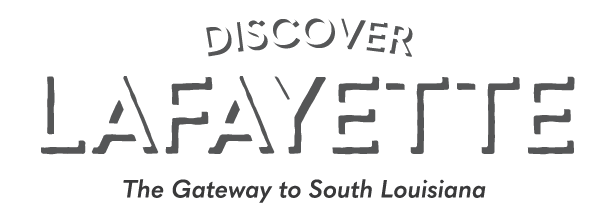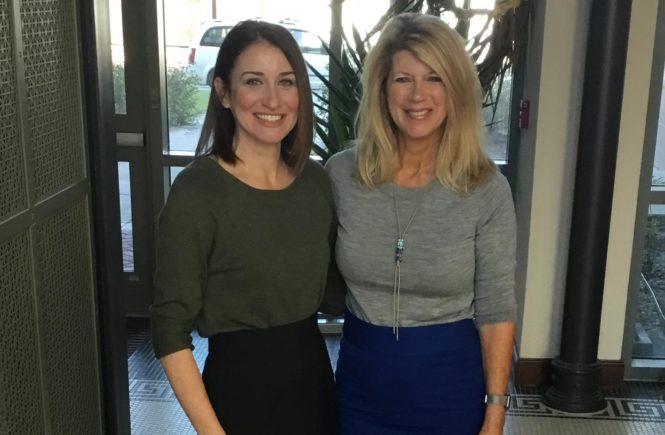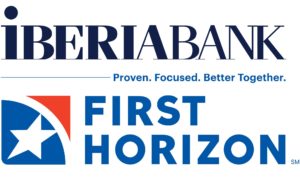Podcast: Play in new window | Download (Duration: 45:32 — 62.5MB)
Kimberly James Boudreaux, Executive Director of Catholic Charities of Acadiana, shares the expansion of services offered by her organization on this episode of Discover Lafayette.
Kim has dedicated her life to being in service to others. As a young adult, she sold all her possessions and traveled abroad to work as a missionary, including time spent with Mother Theresa’s Missionaries of Charity.
Our community has been blessed to have Kim Boudreaux at the helm of Catholic Charities of Acadiana, while she raises her young family with her husband, Matt. This is our second interview with Kim; you can hear our first podcast here.
In the three years since our first talk, Catholic Charities has greatly expanded the services it offers, having opened the doors to The Emily House in 2018 which offers an emergency shelter for homeless women and children. They have added new responsibilities by taking over the Immigration Services and Deaf Action Center formerly run by the Diocese, as well as assuming management of FoodNet Food Bank and Rebuilding Together Acadiana. In 2019, Catholic Charities also became entrepreneurs by taking over ownership of Crossroads Catholic Bookstore, which is now known as Crossroads Collective.
The organization has traditionally taken care of our most vulnerable neighbors through outreach efforts such as disaster response, as well St. Joseph Diner, St. Joseph Shelter for Men, St. Michael Center for Veterans, the Stella Maris Center, and the Monsignor Sigur Center.
Between the COVID shutdown and the disastrous hurricanes that hit Southwest Louisiana, the detrimental effects upon incomes, employment, and housing stability have been devastating. The face of homelessness changed significantly in 2020. While we traditionally related homelessness to a mental illness or substance abuse disorder, today the homeless look vastly different.
Before COVID, people could move to a family member’s home when tough times hit, perhaps keeping their employment while temporarily looking for alternative housing. But the combination of COVID and job losses associated with the shutdown have greatly impacted their struggles. In many cases, doubling up with family members has been found to be unsustainable: it can feel impossible to have multiple families juggling their children’s online Zoom classes while the adults attempt to work from home.
In March 2020, Catholic Charities counted 166 people in their homeless program. Unsheltered homelessness had been at an all-time low as the organization did not turn people away when they were in need and would provide a place to sleep even if it was on the floor. But the social distancing required by the pandemic proved to be too great a challenge given the existing shelter space available for sleeping quarters. And, for the first time since the 1970s, St. Joseph’s Diner had to be closed because the group could not meet the legal requirements for indoor seating or keep the revolving groups of diners and volunteers safe from contracting the virus.
The decision was initially made to convert St. Joseph’s Diner into a shelter and Catholic Charities continued to feed the 166 clients under their care daily. (Kim noted that others were also fed through the back door when in need.) Once the stay-at-home order was lifted, the organization worried about COVID spreading throughout its community as most people in the programs are medically vulnerable. The clients were transitioned into hotels, and Catholic Charities’ staff are present on-site at the hotels 24/7, operating the same services they always have, working to maintain a safe and stable environment.
Since January 2020, the Acadiana region has experienced an 82% increase in homelessness (with family homelessness up over 200% since March 2020), along with a 77% decrease in emergency shelter beds.
Kim notes that “Prevention is such an important part of this puzzle. The experience of losing your home is very traumatic, especially if you have children. Right now, not having shelter options makes it very difficult. Then other things fall apart for the family: you lose your job, the kids don’t go to school and they fall behind. By the time you factor in the cost of rehousing with deposits and getting restabilized, we would all have been better off if we could have prevented the loss of housing from the beginning.”
To prevent homelessness from occurring when possible, Catholic Charities has been offering rent assistance to keep tenants housed and to assist the landlords who would otherwise lose their tenants through eviction for nonpayment of rent. Catholic Charities helps families by negotiating with their landlords to keep the housing situation stable; many landlords are willing to forgo a month or two of rent payments if they can keep their tenants in place. Some funding assistance has come from Community Development block grants from Lafayette Consolidated Government. Incredibly, in all of 2019, Catholic Charities funded $300,000 in rent and utility assistance; in 2020, it averaged $200,000 per month.
For families that do end up homeless, Catholic Charities works to have an emergency shelter response. Their aim is to keep the homeless experience brief and get the families stabilized in housing as quickly as possible.
About 728 people have been housed through the organization’s COVID-19 rehousing program, and hundreds of households were rehoused due to Hurricanes Laura and Delta. Kim believes the effects of this past year will entail a multi-year effort on behalf of our whole community in order to return to normalcy. Children in our community were let out of school on March 12, 2020, and some of the homeless children still haven’t returned to school. It will be a herculean task to help them catch up with their schooling and get back on track.
Catholic Charities of Acadiana has been front and center in meeting the needs of our community in other ways, and the expansion of their programming has provided synchronicity in being able to step up at a time of great need. Taking on operations of FoodNet Food Bank is one example of being in the right place at the right time as it allowed Catholic Charities to partner effectively with struggling food pantries and soup kitchens. Donations were down with the pandemic and it was hard to find food to distribute. FoodNet partnered with grocery stores to purchase food and their volunteers delivered food to the doorsteps of clients in need. Kim believes the timing was blessed.
A partnership with Second Harvest was formalized in 2020 when Drew Brees funded the expansion of the Community Kitchen at St. Joseph’s Diner. The diner was empty at the time due to COVID and Second Harvest approached the organization to propose turning it into a mass production kitchen. Today, they have the capacity to cook thousands of meals a day and are distributing the meals from the diner out into the community. The effort relies upon 15 volunteers per day, each and every day, and this need is being met with the assistance of six members of the National Guards each day. Kim is hoping once people get their second vaccine shot that they will be willing to return to volunteer service. If you are interested in volunteering, please visit their volunteer calendar here.
Rebuilding Together Acadiana is another organization recently taken over by Catholic Charities which has great need for volunteers and resources. With a mission “to serve the parishes of Lafayette, Iberia, Acadia, and Vermilion, we provide home repairs and renovations to homeowners who are unable to make necessary improvements to their homes due to financial hardship, age, or disability.” During the recent hurricanes, over 1000 homes in our region were hit by trees. There are still over 400 homes with trees on them that have not been tarped. Kim noted that once they have ‘triaged’ all of the homes, it will take many years to help these households recover. Volunteers may sign up here.
The efficient and expansive work of Catholic Charities of Acadiana has not gone unnoticed. Last fall, the (Jeff) Bezos Day 1 Families Fund reached out to the organization and invited them to apply for a $5 million dollar grant, the top-level funding awarded to any organization in any size city. Catholic Charities filled out a brief application which was reviewed by a committee of experts that address family homelessness. Catholic Charities had been identified as a group in the U. S. that exemplifies best practices in its outreach work. The basic question asked: “How would you spend $5 million??”
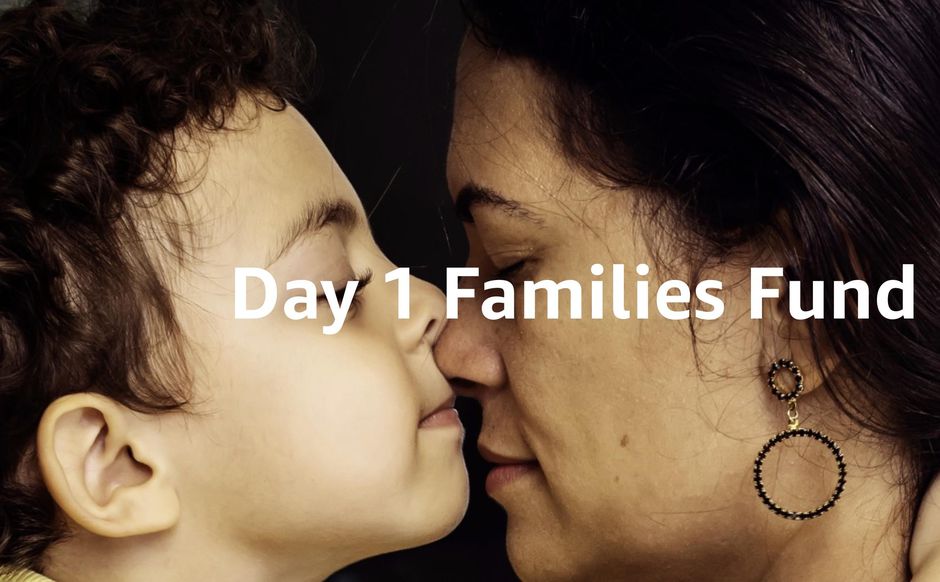
Within a short time, Catholic Charities was notified it had been awarded the top level of funding, to be awarded in the form of $5 million worth of Amazon stock. Kim noted that her organization had never received that much in cash or via stock. According to the Bezos Day 1 Fund website, the funds “are to be dedicated to doing compassionate, needle-moving work to provide shelter and hunger support to address the immediate needs of young families. The vision statement comes from the inspiring Mary’s Place in Seattle: no child sleeps outside.”
The Day 1 Families Fund monies could not have come at a better time to address the needs of homeless families here in Acadiana as well as hurricane evacuees who are primarily here from the Calcasieu Parish area post-COVID.

With the Bezos grant, Catholic Charities has developed a three-phase plan to address homelessness: (1) funding programs that keep at-risk families from losing their own homes. (2) making sure families who do fall into homelessness have a safe shelter by renovating and expanding The Emily House with external doors and private sleeping areas for social distancing. (3) building out a rehousing program to get families back into a permanent place of stability.
A large source of funding for Catholic Charities is obtained from community donations, many from local benefactors who pledge monthly gifts to help their cause. While operating under the auspices of the Roman Catholic Diocese of Lafayette, the organization functions independently and is funded primarily through grants and these local contributions. “Committed donors are critical to the ongoing operations of Catholic Charities of Acadiana,” according to Kim Boudreaux.
Kim Boudreaux shared her gratitude for her team of co-workers who she describes as a “small and mighty crew. They are incredible. “God is always good. It’s a blessing to be a part of this work. I often feel like I’m just sitting in a seat facilitating the work. None of what we’ve done is because of us but because God has provided the means to do what we do.”
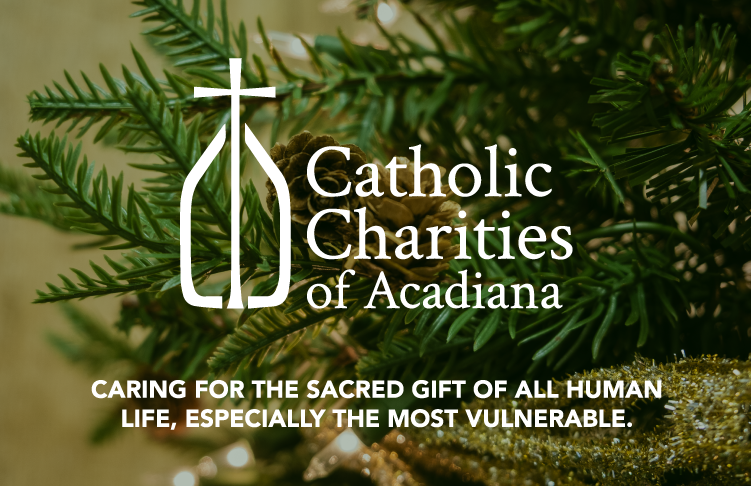
In closing, Kim Boudreaux shared her life philosophy honed from her time working with Mother Teresa’s Missionaries of Charity and how she copes with the undertaking at hand. At times, sometimes several times a day, the work can be overwhelming as she realizes the amount of work that needs to get done, which will never be completely finished. “I never look at the masses. I look at the person in front of me and respond to one person at a time. Sometimes the enormity of the situation takes my breath away. I remember, let’s just do the next thing, don’t look ahead one month.”
It’s been especially difficult to plan during these uncertain COVID times and Kim Boudreaux is hoping along with the rest of us for a more stable and peaceful 2021.
We thank Kim Boudreaux and the entire team at Catholic Charities of Acadiana for the incredible work they accomplish to help those among us who are most vulnerable. For more information, please visit http://catholiccharitiesacadiana.org/.
